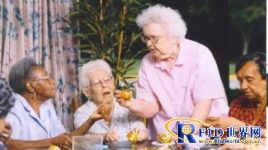
England adopts RFID technology to improve the service level of nursing homes for the elderly
[ad_1]
Alzheimer’s disease is a chronic and progressive mental decline disease. Different levels have different impacts on the lives of the elderly. It is understood that there is currently no specific medicine for this disease, so it is very important to do a good job in nursing care. But for the staff in nursing homes for the elderly, nursing care is not easy. How to improve the work efficiency of service staff and how to provide patients with better services has also become the focus of these nursing homes.
NCC advocates RFID system
Five elderly care homes under the jurisdiction of Nottingham, England have recently adopted an RFID system. They put RFID button tags on the clothes of elderly people to help staff track the clothes of specific elderly people. This system was initiated by the Nottingham City Government in the United Kingdom to improve the level of service for patients with Alzheimer’s disease.

The system name is Stayput and it is provided by Tunstall, a British remote service solution provider. The Stayput system includes 11 buttons, embedded passive HF 13.56MHz RFID tags, and supports the ISO 15693 standard. These button tags can withstand multiple washings, are programmable and reusable, have a storage capacity of up to 200 characters, and can store the name and room number of the clothes owner and other information. The label is affixed with a motorized desktop button applicator and can be removed with a hand-held tool. In addition to the tag, the system also includes a handheld.
“Nursing Dignity Movement”
NCC’s advocacy of this approach is actually based on supporting the “Nursing Dignity Campaign” carried out by the United Kingdom, with the goal of achieving zero abuse and zero disrespect in the medical system application. The municipal department first came into contact with the Stayput system in 2007. The official responsible for the project, Kate Fisher, said that its staff have been in need of developing a service that can improve the service status of dementia patients in nursing homes for the elderly.
Fisher pointed out that a major task of the project is to maintain the privacy of patients with Alzheimer’s disease and respect their personality. In the past, it was inappropriate to write the name of the old man on the clothes or to paste a bar code with the name of the old man. The Stayput system adopted has achieved the purpose of maintaining the dignity of the elderly.
Successfully implemented
The system was implemented for the first time and was deployed in the Laura Chambers Lodge nursing home for the elderly. There are 30 rooms in this nursing home, 20 of which are exclusively for dementia patients. According to Sheila James, a laundry worker at the hospital, she has implemented this system very well because it can make washing clothes more efficient. She also said that many families and residents like this RFID system because the buttons can be easily attached to clothes and are very strong.
These button tags are compiled with necessary information and can be read by hand. Put it on the clothes with the customer’s presence on the spot. After cleaning, the staff will iron it, then scan it with a handheld reader, and finally put it away by the owner.
After the elderly leave the nursing home, the button tags will be removed. Although there is no exact rule on the number of button labels used by each customer, the relevant personnel say that each person uses about 30 to 50 on average. The underwear is washed separately, and everyone’s clothing is placed in a mesh bag with a button label affixed to it.
For those resident customers, in addition to coding their names on the button labels, other information will also be coded into this system. For short-term residents, only the room number of each customer is included in the button tag.
Follow-up
After successful implementation, the system was expanded to four other nursing homes for the elderly in the city, with more than 140 elderly customers.
It has been more and more widely applied to those organizations that need to handle large-scale bed linen and garment washing.
[ad_2]



